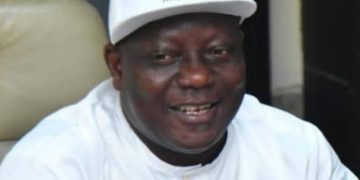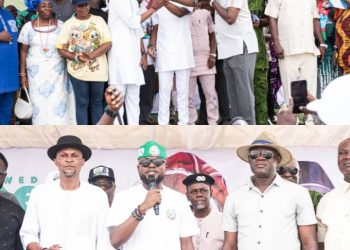By Emeke Alexander
Olorogun David Edevbie on September 8, 2022, filed a Notice of Appeal at the Supreme Court challenging the judgement of August 29, 2022, of the Court of Appeal, Abuja Judicial Division, which declared Rt Hon Sheriff Oborevwori as the lawful and authentic candidate of the Peoples Democratic Party, PDP, in Delta State for 2023 general elections.
Edevbie approached the Apex Court with 23 grounds of appeal contained in a 22-page Notice of Appeal marked SUIT No. FHC/ABJ/CS/795/2022.
It has David Edevbie as the Appellant while Oborevwori Sheriff Francis Orohwedor, People’s Democratic Party (PDP) and Independent National Electoral Commission(INEC) are Respondents 1, 2 and 3 respectively.
The Court of Appeal, Abuja Division had on August 29, 2022, set aside the judgement of the Federal High Court, Abuja Division delivered by Taiwo O. Taiwo, on July 7, 2022, declaring the Appellant, David Edevbie as the lawful and authentic governorship candidate in Delta State on the ground that the documents submitted to INEC by the first Respondent, Oborevwori Sheriff Francis Orohwedor, contain discrepancies that are irreconcilable.
GROUNDS OF APPEAL:
GROUND 1: The learned Justices of the Court of Appeal erred in law, when they held that: The fact that the Appellant mentioned that his appeal was commenced by Notice of Appeal filed on the 8/7/2022 against the judgment of the Lower Court cannot deprive him of the right to rely on subsequent Notice of Appeal filed on the 20/07/2022. There is no miscarriage of justice suffered”.
GROUND 2: The learned Justices of the Court of Appeal erred in law when they held that: “I’m of the firm view that the impugned grounds of appeal do not violate Onder 7 Rule 3 of the Court of Appeal rules 2021. They are quite apt and direct and concise. The said grounds of appeal cannot be said to be vague, imprecise or general in terms”.
GROUND 3: The learned Justices of the Court of Appeal erred in law when they held that instant suit at the trial Court was not cognizable as an Originating Summons action.
GROUND 4: The learned Justices of the Court of Appeal erred in law, when they held that the case of PDP & ORS V. DEGI-EREMIENYO & ORS (2020) LPELR-49734 (SC) had been “superseded” by the Supreme Court and that same did not apply to the narrow facts of the instant case.
GROUND 5: The learned Justices of the Court of Appeal erred in law when they held that the cause of action of the Appellant had not crystallized and was pre-mature, via their holding thus:
“I am of the solemn view that unless and until the 2nd Respondent forwards the name of the Appellant to the 3rd Respondent along with the Affidavit sworn to by the Appellant as Candidate of the 3rd Respondent stating that he has fulfilled all of the requirements as per Section 177(a)-(d) of the said Constitution and the right of action under Section 177(d) and 182(1) (j) of the Constitution, the right of action of the 1st Respondent as an aspirant who participated in the Governorship primary of the 2nd Respondent on the 25/5/2022 remains in abeyance. His right to sue has not consummated or accrued under the said provisions of the law.”
GROUND 6: The learned Justices of the Court of Appeal erred in law when they held that the Appellant did not have a cause of action under Section 84(14) of the Electoral Act.
GROUND 7: The learned Justices of the Court of Appeal erred in law when they failed and refused to apply the extant doctrine of Quin Timet as postulated by the same Court of Appeal in the case of PDP V. LAWAL & ORS (2012) LPELR-7972(CA), to the instant case.
GROUND 8: The learned Justices of the Court of Appeal erred in law, when they held that: “The question is whether the 1 Respondent proved his case against the Appellant. All the criminal allegations contained in the reliefs sought and the Affidavit evidence in support of the 1″ Respondent case against the Appellant must be proved beyond reasonable doubt notwithstanding that this is a civil action and a pre-election matter.”
GROUND 9: The learned justices of the Court of Appeal, erred in law when they held that: “Failure to call evidence from the institutions that issued the certificates and other impugned documents and the prove of particulars of forgery and fake documents alleged on those particulars of forgery and false information allegedly passed to the 2nd and 3rd Respondents by the Appellant as contained in the Affidavits of the 1st Respondent knocked the bottom out of the 1st Respondent’s case as the Plaintiff at the lower Court.”
GROUND 10: The Court of Appeal erred in law when it held that the condition precedent as prescribed in Section 29(1), (2), (3) and (4) of the Electoral Act 2022 must accrue before the Appellant’s cause of action can crystalize in this case.
GROUND 11: The Court of Appeal erred in law when it held that the Appellant has a statutory burden to prove the allegations made against the 1 Respondent beyond reasonable doubt pursuant to sections 135(1) and (2) and 139 of the Evidence Act in order to succeed on his reliefs.
GROUND 12: The Court of Appeal erred in law when it held inter alia that the Appellant was not entitled to the judgment of the trial Court.
GROUND 13: The Court of Appeal misdirected itself when it misapplied the decisions in the cases of Mohammed v Wammako (2018) 7 NWLR (1619); Ibezim v Ebeleke (2022) 4 NWLR (PART 1819) 1; APC v Obascki & Ors (2022) 2 NWIR (PART 1814) 273; APC v. Ebeleke & Ors (2022) 10 NWLR (PART 1837) and reached the erroneous conclusion that the Appellant failed to discharge the burden of proof on him by the standards required.
GROUND 14: The Court of Appeal erred in law when it held that the Appellant did not complain that there was non-compliance with the provisions of the Electoral Act 2022.
GROUND 15: The Court of Appeal erred in law in dismissing the action of the Appellant when it ought to have affirmed the decision of the trial court.
GROUND 16: The learned justices of the Court of Appeal erred in law and occasioned a miscarriage of justice to the Appellant when they made out a case for the 1st Respondent different from the case he presented before the Lower Trial Court.
GROUND 17: The Lower Appellate Court erred in Law and occasioned a grave miscarriage of Justice when they held that the 1st Respondent denied the allegations of the Appellant contained in the Affidavit in support of the Originating Summons; when they held thus: “I am of the very firm that the Appellant actually frontally denied every allegation contained in the 1st Respondent’s Affidavit in support of the Originating
Summons…”
GROUND 18: The Lower Appellate Court erred in Law and occasioned a grave miscarriage of justice to the Appellant when the Court held: “The heinous allegations of swearing to false affidavits, forging and faking of educational credentials made by the “Respondent against the Appellant cannot be established or proved by mere assertions and comparisons carried out by the 1st Respondent in the Supporting Affidavit to his Originating Summons. The 1st Respondent is under a holden duty to produce the originals of the credentials or the certificates claimed by the Appellant as belonging to him before the lower Court.”
GROUND 19: The Court of Appeal erred in law when it held that the Appellant did not establish the allegations which he made against the 1st Respondent and thereby dismissed the Appellant’s action.
GROUND 20: The Court of Appeal erred in law when it held that even if the Appellant proved his case under section 29(5) of the Electoral Act, he cannot be the beneficiary of the disqualification of the 1st Respondent because under section 29(6) of the Act both the Candidate and the political party would be disqualified and both of them would cease to be participants in the election in question.
GROUND 21: The Court of Appeal erred in law when it held that the Appellant did not complain that there was non-compliance with the provisions of the Electoral Act 2022 and therefore did not make out any case under Section 84(14) of the Act.
GROUND 22: The learned Justices of the Court of Appeal erred in law when they held that the Appellant does not have a cause of action under Section 177 of the 1999 Constitution (As Amended).
GROUND 23: The learned Justices of the Court of Appeal erred in law when they held that the Appellant does not have a cause of action under Section 182 of the 1999 Constitution (As Amended).
Consideration of issues on the appeal at the Supreme Court comes up on September 30, 2022.
Recall that the Court of Appeal, Abuja Division had on August 29, 2022, set aside the judgement of the Federal High Court, Abuja Division delivered by Taiwo O. Taiwo, on July 7, 2022, declaring the Appellant, David Edevbie as the lawful and authentic governorship candidate in Delta State on the ground that the documents submitted to INEC by the first Respondent, Oborevwori Sheriff Francis Orohwedor, contained information that is irreconcilable.













